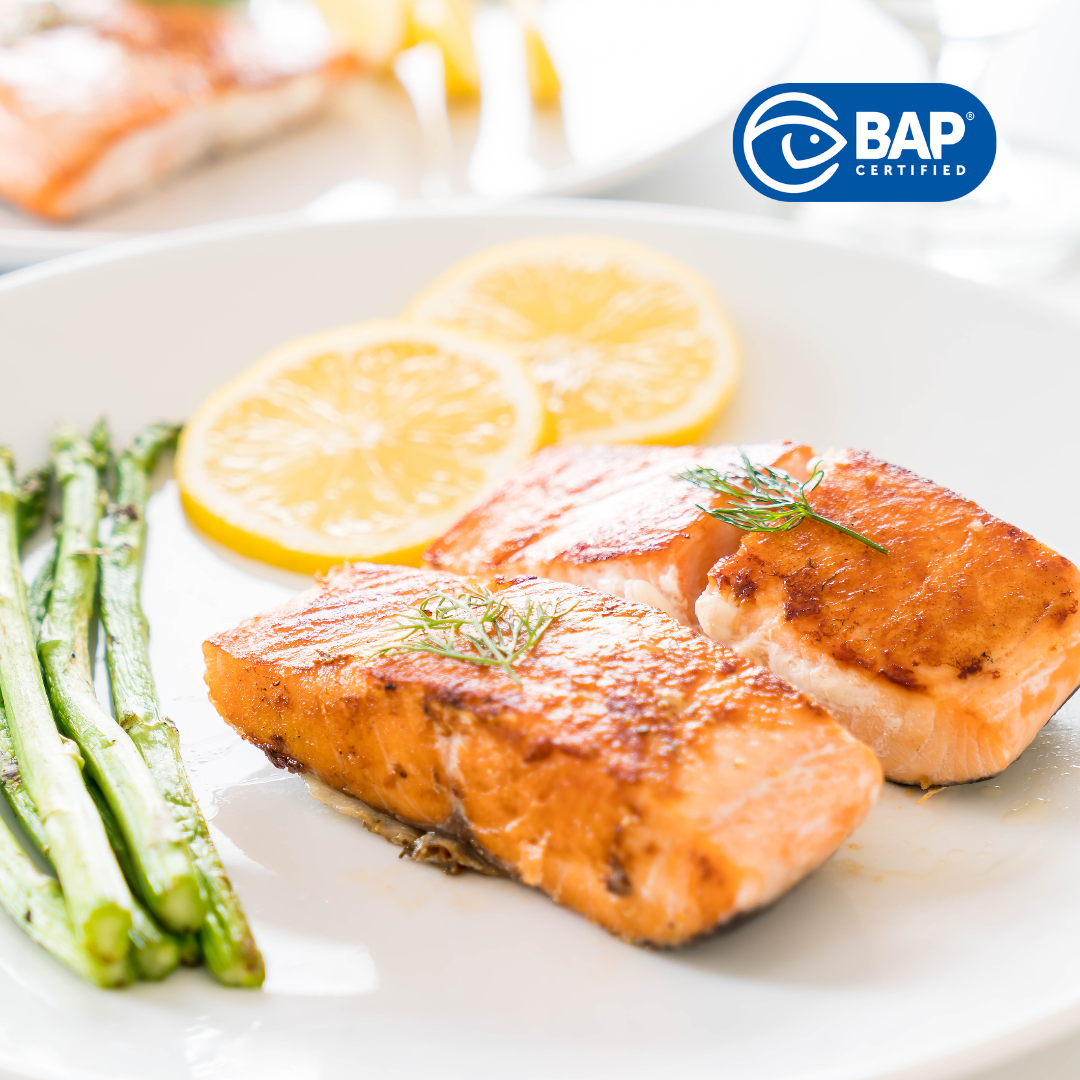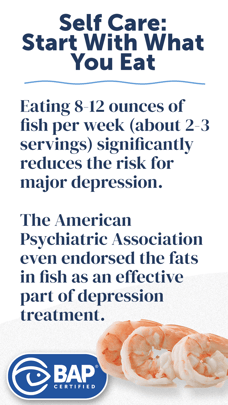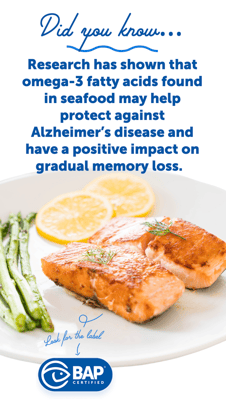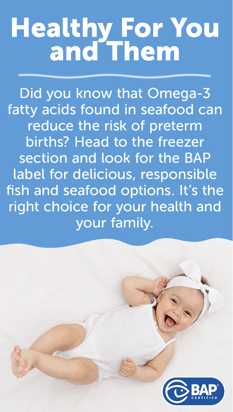Seafood & Health
Wealth for Your Health
Seafood is a nutritionally dense food, meaning it gives you a great bang for your food bucks. By eating more fish and seafood, you will nourish your body with:

Protein is used to build and repair muscles and bones and to make hormones and enzymes. It can also be used as an energy source.
Omega-3 fatty acids, also known as DHA and EPA. These healthy fats are essential because your body cannot make them on its own. They have protective and beneficial effects and are found naturally in seafood. Find which seafood has the most omega-3s.
Vitamin D helps with the absorption of calcium. Few foods contain vitamin D, but it can be found in fatty fish such as trout, salmon, tuna, and mackerel.
Vitamin B12 helps with cell metabolism, nerve function, and the production of DNA.
Iron helps maintain healthy blood and is needed for growth and development.
Selenium protects cells from damage.
Zinc helps the immune system fight off infection. During pregnancy, infancy, and childhood, zinc is needed for proper growth and development.
Iodine is an essential mineral that is not made by the body, so it must be obtained by food or supplements. It supports a healthy metabolism, which controls everything from appetite to your immune system.
What is a serving?
The USDA Dietary Guidelines for Americans recommends at least 8 ounces of seafood (less for children) per week based on a 2000-calorie diet. When pregnant or breastfeeding, women can benefit from 8-12oz per week of a variety of seafood choices that are low in mercury. In order to get the most benefit, consume a variety of different forms and species. This will help you meet your goal of at least two servings a week and give you a range of key nutrients.

-
Sustain Your Energy, Fitness and Performance
Whether you are a weekend warrior or a serious athlete, you want to make sure that you can sustain your energy during your workout and after your workout so that you can have a productive day and work out again that week. Seafood can help both mentally and physically.
How can incorporating seafood into your diet enhance your performance?
-1.png?width=225&height=400&name=MicrosoftTeams-image%20(5)-1.png)
- Seafood improves memory and mental sharpness thanks to omega-3 fatty acids found in fish. Omega-3 fatty acids also help reduce inflammation post-workout. Fattier fish also provides a good source of vitamins D and A, and also contain the fat that helps the body absorb these important fat-soluble vitamins.
- Seafood is rich in calcium and phosphorus and is a great source of minerals such as iron, zinc, iodine, magnesium and potassium for added benefits. Seafood also offers the perfect protein boost after exercise to rebuild and refuel the body.
How can seafood consumption contribute to increased energy levels?
- Seafood is rich in protein to help keep your metabolism running, your blood sugar levels stable and your energy high.
- Seafood (when not fried or cooked in heavy cream or oil) is low in total calories and unhealthy saturated fat, so it keeps you full without weighing you down.
-
Sustain Your Mental Health
Seafood offers a variety of nutritional benefits that can positively affect mental health.
How does nutrition influence our mental health?
- Our brains require a constant supply of fuel, and food fuels the body and brain. What you eat directly affects the structure and function of your brain and ultimately, your mood. There are several reasons for this, including how your diet affects inflammation and good gut bacteria.
What benefits does seafood provide for brain/mental health that you may not get from other animal proteins?

- Unlike other animal proteins, seafood contains omega-3 fatty acids. The human body can make most of the fats that it needs from other fats, but that is not the case for omega-3 fatty acids. They are considered "essential" because your body cannot make them and must get them from food or supplements.
- Seafood is also a natural source of Vitamin D, which has also been linked to lower rates of depression.
- Omega-3 fatty acids are found in most fish, but highest amounts are in fattier fish. Some good sources include salmon, oysters, trout and sardines.
- Vitamin B12 found in fish is crucial for the growth of healthy red blood cells, DNA reproduction, and nerve function. Consuming enough vitamin B12 is also linked to lower risk of dementia.
- Selenium is a potent antioxidant found in fish that protects against cell damage and may help to counter the negative effects of mercury.
-
Sustain Your Health As You Age
Although different generations have different health goals, seafood offers a nutritional profile that can benefit you at any age.
How can the nutrients found in seafood contribute to healthy aging?

- Research suggests that omega-3 fatty acids found in seafood can help protect against Alzheimer's disease and have a positive impact on gradual memory loss.
- Heart disease is the leading cause of death in the United States. The American Heart Association recommends eating 2 servings of fish per week. Fatty fish like salmon, mackerel and trout are high in omega-3 fatty acids. Seafood also contains vitamin B12 which is linked to lower rates of heart disease.
- Seafood is a great source of lean protein, and studies have shown that people who eat more protein tend to maintain bone mass better as they age and have a much lower risk of osteoporosis and fractures.
- Maintaining a healthy weight is one of the best things you can do for your health as you age. Seafood is a high protein meal choice and studies show that protein is more filling than carbohydrates and less caloric than fat. In other words, eating seafood makes you feel full with less food.
-
Sustain Your Family
Should you eat seafood while pregnant?
- Yes! Those who are pregnant or breastfeeding should consume between 8 and 12 ounces of seafood per week.
What benefits are there to the baby if the mother eats seafood while pregnant?

- Seafood, which includes fish and shellfish, can be a great source of protein, iron and zinc – crucial nutrients to support your baby's growth and development. Omega-3 fatty acids found in many fish, including docosahexaonic acid (DHA), can also promote your baby's brain development. In fact, in a study from Harvard Medical School, the more fish pregnant women ate during the second trimester, the higher their babies scored on a mental development test at 6 months of age.
How can eating seafood benefit children's health and nutrition?
- Omega-3 fatty acids support a child's brain development, iron and zinc support their immune systems and choline also supports the development of a baby's spinal cord.
What are some tips for getting your child to eat seafood?
- Try different fish! There are so many varieties of seafood available. Serving sizes for children are smaller, so just a couple bites a week can meet their needs.
What is a serving?
- One serving is 4 ounces, about the size of a deck of cards. For children, on average a serving is about 1 ounce at ages 1-3, 2 ounces at ages 4-7, 3 ounces at ages 8-10 and 4 ounces at age 11 to adulthood.
Sustain Your Energy, Fitness and Performance
Whether you are a weekend warrior or a serious athlete, you want to make sure that you can sustain your energy during your workout and after your workout so that you can have a productive day and work out again that week. Seafood can help both mentally and physically.
How can incorporating seafood into your diet enhance your performance?
-1.png?width=225&height=400&name=MicrosoftTeams-image%20(5)-1.png)
- Seafood improves memory and mental sharpness thanks to omega-3 fatty acids found in fish. Omega-3 fatty acids also help reduce inflammation post-workout. Fattier fish also provides a good source of vitamins D and A, and also contain the fat that helps the body absorb these important fat-soluble vitamins.
- Seafood is rich in calcium and phosphorus and is a great source of minerals such as iron, zinc, iodine, magnesium and potassium for added benefits. Seafood also offers the perfect protein boost after exercise to rebuild and refuel the body.
How can seafood consumption contribute to increased energy levels?
- Seafood is rich in protein to help keep your metabolism running, your blood sugar levels stable and your energy high.
- Seafood (when not fried or cooked in heavy cream or oil) is low in total calories and unhealthy saturated fat, so it keeps you full without weighing you down.
Sustain Your Mental Health
Seafood offers a variety of nutritional benefits that can positively affect mental health.
How does nutrition influence our mental health?
- Our brains require a constant supply of fuel, and food fuels the body and brain. What you eat directly affects the structure and function of your brain and ultimately, your mood. There are several reasons for this, including how your diet affects inflammation and good gut bacteria.
What benefits does seafood provide for brain/mental health that you may not get from other animal proteins?

- Unlike other animal proteins, seafood contains omega-3 fatty acids. The human body can make most of the fats that it needs from other fats, but that is not the case for omega-3 fatty acids. They are considered "essential" because your body cannot make them and must get them from food or supplements.
- Seafood is also a natural source of Vitamin D, which has also been linked to lower rates of depression.
- Omega-3 fatty acids are found in most fish, but highest amounts are in fattier fish. Some good sources include salmon, oysters, trout and sardines.
- Vitamin B12 found in fish is crucial for the growth of healthy red blood cells, DNA reproduction, and nerve function. Consuming enough vitamin B12 is also linked to lower risk of dementia.
- Selenium is a potent antioxidant found in fish that protects against cell damage and may help to counter the negative effects of mercury.
Sustain Your Health As You Age
Although different generations have different health goals, seafood offers a nutritional profile that can benefit you at any age.
How can the nutrients found in seafood contribute to healthy aging?

- Research suggests that omega-3 fatty acids found in seafood can help protect against Alzheimer's disease and have a positive impact on gradual memory loss.
- Heart disease is the leading cause of death in the United States. The American Heart Association recommends eating 2 servings of fish per week. Fatty fish like salmon, mackerel and trout are high in omega-3 fatty acids. Seafood also contains vitamin B12 which is linked to lower rates of heart disease.
- Seafood is a great source of lean protein, and studies have shown that people who eat more protein tend to maintain bone mass better as they age and have a much lower risk of osteoporosis and fractures.
- Maintaining a healthy weight is one of the best things you can do for your health as you age. Seafood is a high protein meal choice and studies show that protein is more filling than carbohydrates and less caloric than fat. In other words, eating seafood makes you feel full with less food.
Sustain Your Family
Should you eat seafood while pregnant?
- Yes! Those who are pregnant or breastfeeding should consume between 8 and 12 ounces of seafood per week.
What benefits are there to the baby if the mother eats seafood while pregnant?

- Seafood, which includes fish and shellfish, can be a great source of protein, iron and zinc – crucial nutrients to support your baby's growth and development. Omega-3 fatty acids found in many fish, including docosahexaonic acid (DHA), can also promote your baby's brain development. In fact, in a study from Harvard Medical School, the more fish pregnant women ate during the second trimester, the higher their babies scored on a mental development test at 6 months of age.
How can eating seafood benefit children's health and nutrition?
- Omega-3 fatty acids support a child's brain development, iron and zinc support their immune systems and choline also supports the development of a baby's spinal cord.
What are some tips for getting your child to eat seafood?
- Try different fish! There are so many varieties of seafood available. Serving sizes for children are smaller, so just a couple bites a week can meet their needs.
What is a serving?
- One serving is 4 ounces, about the size of a deck of cards. For children, on average a serving is about 1 ounce at ages 1-3, 2 ounces at ages 4-7, 3 ounces at ages 8-10 and 4 ounces at age 11 to adulthood.